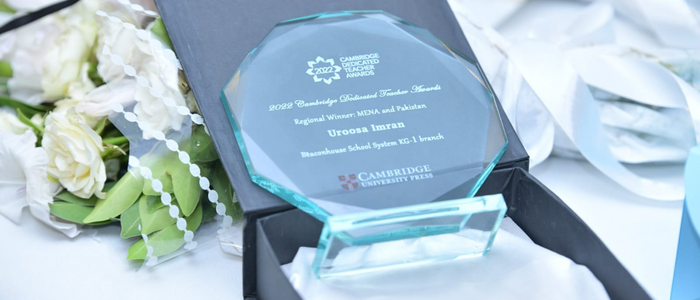Ms Uroosa Imran is the regional winner of the Cambridge Dedicated Teacher Award 2022 in Pakistan. An Early Years teacher at Beaconhouse School in Pakistan, Uroosa won the award for her dedication to teaching a young student who suffers from a rare muscular disease. On International Women’s month, we spotlight her work in creating an inclusive learning environment, where every child feels supported to learn.
Tell us about discovering your passion for teaching and who inspired you
I started teaching after getting married. My first son had just started school and at the time, I was working towards my degree, so I wanted to do something that would allow me to further enhance my skills, and teaching offered me that.
Although I didn’t realise it at the time, my teaching journey was inspired by my English teacher in Grade (Year) 7. I struggled with writing and was always told, “you must improve your handwriting”. However, my English teacher was more interested in what I was writing than how my writing looked. She inspired me to be the best I can be. I enjoyed her lessons and looked forward to them. She was engaging and kind. She was very soft-spoken, a relatively new teacher at the time, but she was excellent.
What is it that you enjoy most about teaching?
I want to have a positive impact on children’s lives. As a teacher, you achieve this by being kind, caring, empathic, passionate, and funny. They are great qualities for a teacher to possess. One of my favourite parts of teaching is the bond you create with the students, and being able to see their growth from the start to the end of each academic year. Each day I do my best to make a difference with my students.
I love coming to school every day!
Teachers, in my opinion, are the most powerful change agents because they can foster young brains, nourish young souls, and help direct students to the right path.
My students are very eager learners and excel the most when learning through hands-on, engaging activities.
Tell us about some of the principles you teach in your classroom
The philosophy in our classroom is that we can accomplish anything we put our minds to. The words ‘I can’t’ are replaced with ‘I am going to try my best.’
I want my students to believe that they can accomplish anything they set out to do, no matter what challenge is put in front of them.
How do you ensure equity and inclusion among your students?
One of the children I teach has a rare muscular disease. In the beginning, he was unable to speak, sit, walk, or hold things in his hands. He has a cochlear implant and comes to school in a wheelchair.
I make sure he is never left out and is supported in indoor and outdoor activities – during the morning assembly presentations, music classes, physical exercise, arts, etc – by using a multisensory approach and encouraging him to work like the other students.
He needs special attention in all areas so I provided him with play dough and a sand tray to form letters and numbers, and pegging activities to develop his fine motor skills.
I selected a few games for him that only required him to use his hands. This helped him to participate in the annual Sports Day, and not only did he not feel left out, but he also came second on Sports Day!
With my continuous support and motivation, he is now able to work with minimal support and can trace letters and numbers on the worksheets. He can match numbers with values and has a sound understanding of different concepts. He identifies the sounds of all the letters with actions and through air formation and moves his hands to communicate the sound or name of letters.
It has been so beautifully rewarding to hear him start speaking in sentences and say things like “ this is a sun sss sun, This is Zebra zz Zebra.
Because of the support we provide him at school, and by making him feel included, he comes to school happy and participates in all the activities, and is learning to express his needs and wants.
His parents are extremely grateful to me and the Headmistress, as before getting admission here he was turned away by many schools due to his physical impairments. However, we believe in inclusive education for all!
Have you received any formal training on working with students with disabilities?
I have engaged in various training and workshops including some on ‘learning through play’ and ‘how to teach using technology’ but I have not received any training to work with students with disabilities.
My headmistress at the school is my mentor and has guided me to implement the Early Years curriculum effectively and supported me on how to work with students with disabilities. She guided me to use a multisensory approach for my student and recognised his intelligence. To me, it shows just how inclusive we are as a school.
What is your most memorable teaching moment?
One of the most memorable moments in my career so far was when I saw a change of behaviour in one of the students, who was going through some trouble in their home life.
She used to come to school full of energy with a smile on her face and suddenly that stopped.
She sat on her own, did not play with her friends, and showed little interest in taking part in activities inside and outside the classroom.
I sat with her once during lunch and asked if she wanted to share my lunch. I had made a delicious sandwich and although she said no, I offered to comb her hair and engage her in discussions about her hobbies, favourite film to watch, favourite food, etc.
By paying attention and recognising she was not herself and providing her with the attention and safety she requires from a school, I have seen her open up again and slowly become the happy student she has always been.
On International Women’s month, what is your advice for teachers, students, and schools in embracing equity in education?
Every child can learn but at his or her own pace, and as educators, we need to ensure that we improve the learning conditions for all students.
A teacher is responsible not only for finishing the curriculum or the syllabus, but also for shaping and moulding a child in such a manner that they become a responsible citizen in our society.
Teachers have the power to be role models to their students and to ensure that children learn. We remain truly dedicated to our profession and for me, it comes with realising that I may not be the best but I will always try my best. The same principle I teach my students.
I want my students to believe that they can accomplish anything they set out to do no matter what challenge is put in front of them, to respect everyone’s opinion, and for schools to commit to providing an education that is inclusive and equitable for all.
The Cambridge Dedicated Teacher Awards are now open and you can nominate a teacher that has gone above and beyond.





